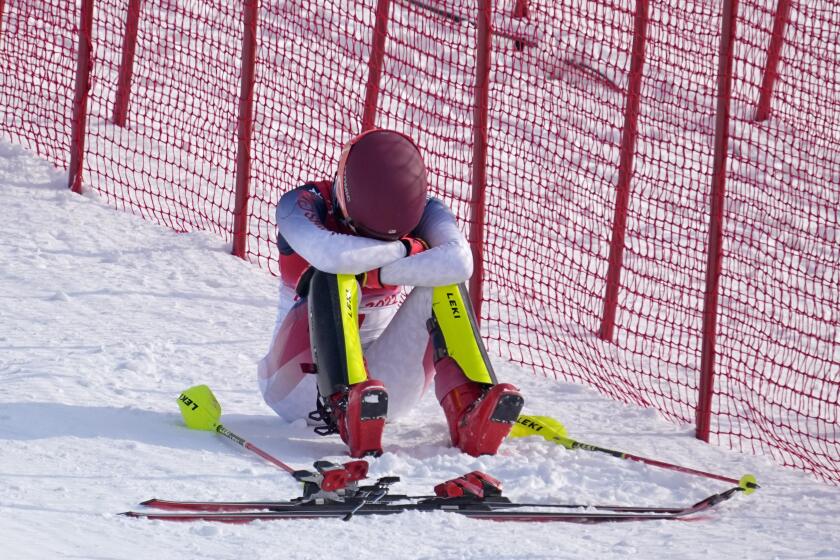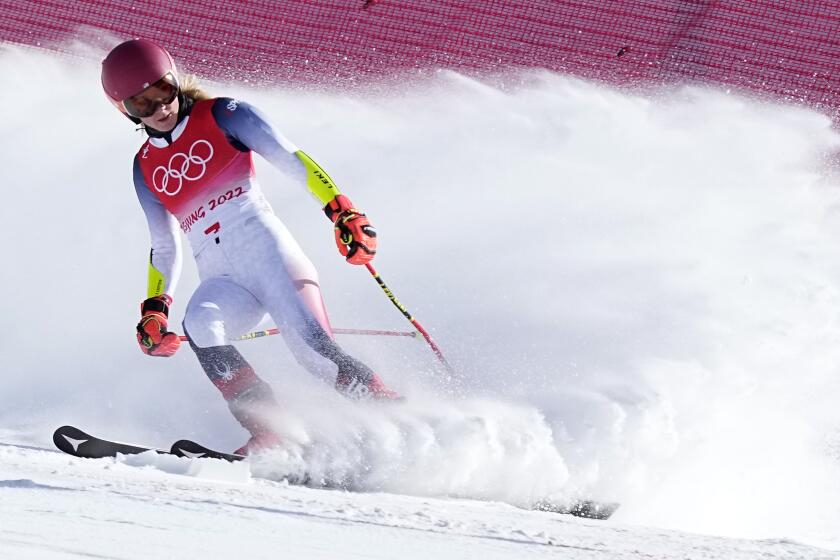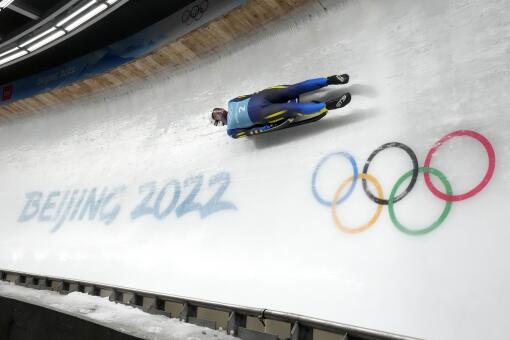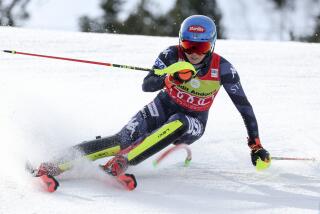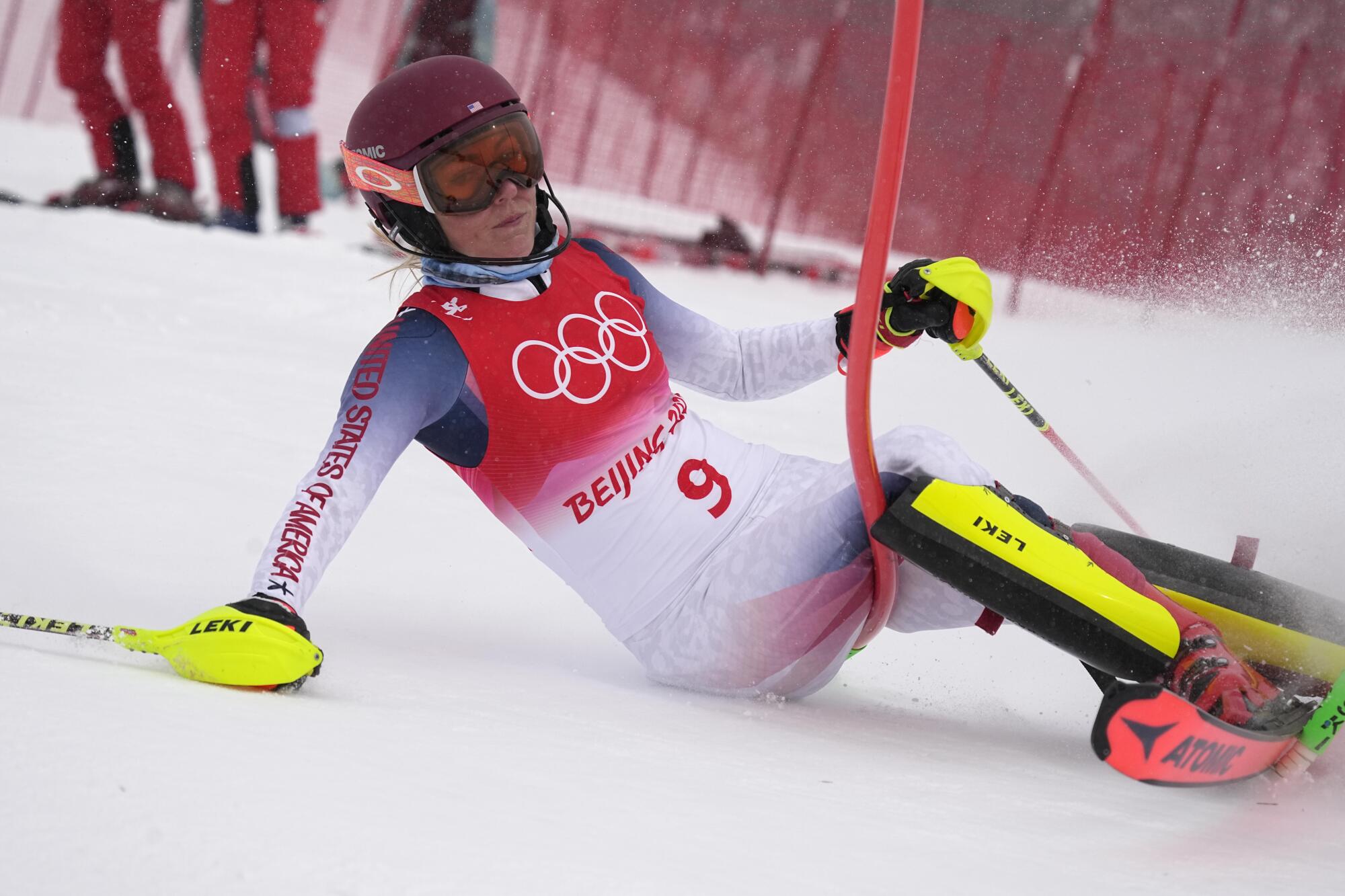
- Share via
BEIJING — The final obstacle between Mikaela Shiffrin and a medal was the plunging slalom course called the Ice River.
After two weeks of hype and heartbreak at the Winter Olympics, all the world’s most dominant female skier needed was a clean run through the 63 gates to earn a spot on the podium in the combined.
But as the sun fought to break through snow flurries that dusted the Yanqing National Alpine Centre on Thursday, Shiffrin’s inexplicable Olympics took another inexplicable turn in her fifth and final individual event.
One of her skis clipped a gate seconds into the race and sent her crashing into the snow as disbelieving gasps filled the finish area from people watching the giant video board.
The race — and her last chance to win an individual medal — ended in a staggering instant as she didn’t finish a race for the third time at these Games.
Mikaela Shiffrin’s two bad runs underscores the pressure athletes face at an event that happens only once every four years.
“Come on, how many times have I [not finished] in my whole career?” Shiffrin asked rhetorically. “Of course, she’s at least going to make it to the finish. This could just be the medal that salvages everything after all. Right now I just feel like a joke.”
The harsh words underscored the painful, unexpected journey over the last 10 days.
The 26-year-old arrived in China as one of the faces of the Games, the second-winningest female skier of all-time was featured in television commercials escaping dinosaurs and had designs on pursuing medals in five individual events to go along with the two golds she already owned.
A few hours before Shiffrin’s first event, the giant slalom, her brother Taylor believed all was well: “At this exact moment in time they’re relatively decent there. They feel like they’re in a relatively comfortable spot, as much as you can be.”
Then Shiffrin skied out on the first run of the giant slalom.
Two days later, the slalom looked like the ideal opportunity to bounce back. Shiffrin has won her signature event a record 47 times on the World Cup circuit, dominating it like no one else on the planet.
Then she skied out on the first run of the slalom.
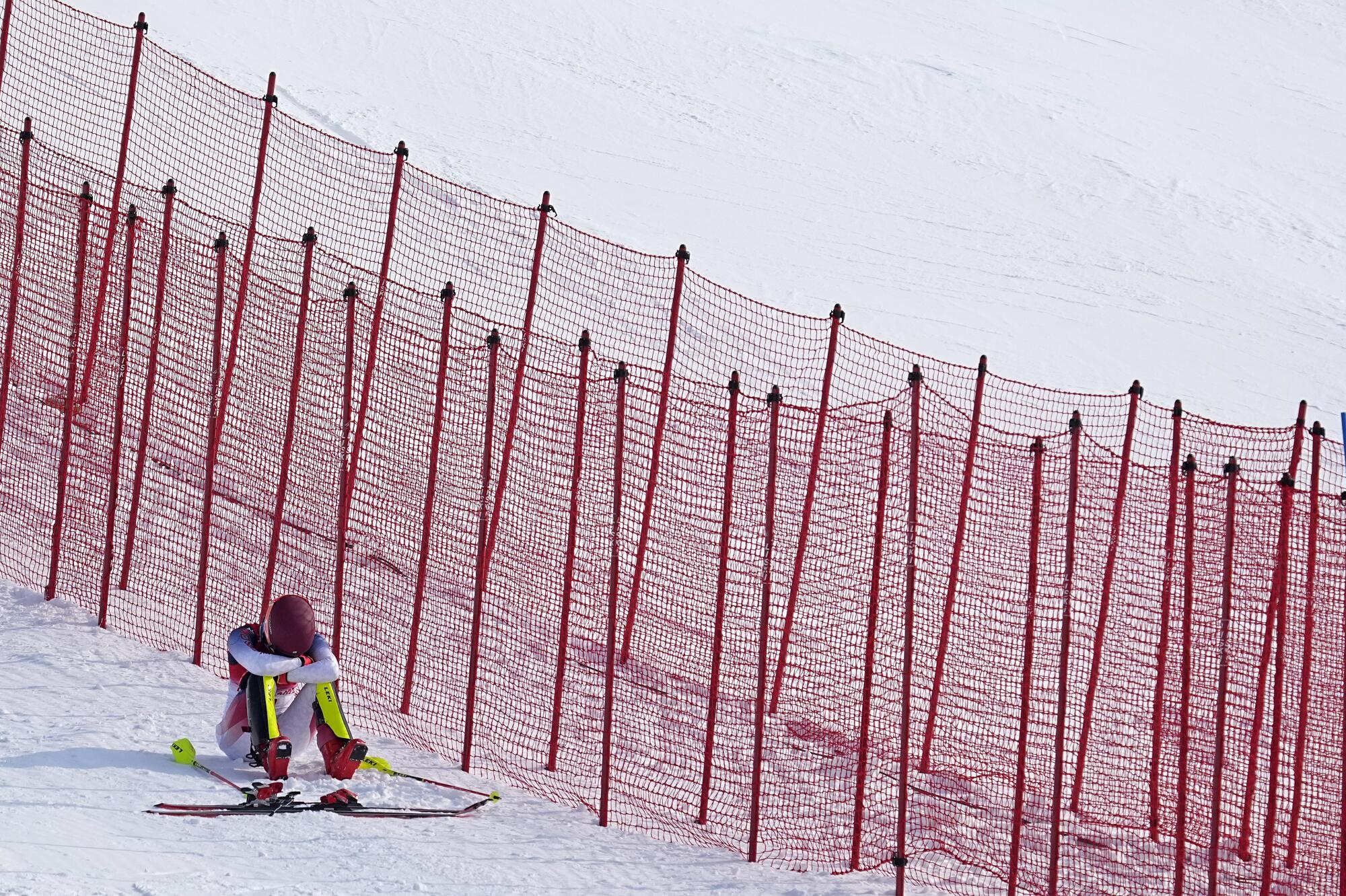
Shiffrin sat in the snow on the side of the Ice River course, head buried in her hands, for about 20 minutes afterward as she tried to sort out what had gone wrong. There wasn’t a clear answer.
She had missed a week and a half of training and competition in December after testing positive for the coronavirus. A back injury cost more time in October and November. But she remained the world’s top-ranked female skier.
Something deeper lingered. Shiffrin’s father, Jeff, died in February 2020 after an accident at the family’s home in Colorado. The death sapped his sister’s motivation for a time, Taylor Shiffrin said, making her return to the sport and the Olympics a “monumental accomplishment.” Arriving at her third Olympics brought reminders of her father rushing back.
In two years, Shiffrin has experienced the sudden death of her father, a back injury and a positive test for the coronavirus.
“It does give me perspective, but right now, I would really like to call him,” she said after the slalom. “So, that doesn’t make it easier. He would probably tell me to get over it. But he’s not here to say that, so on top of everything else I’m pretty angry at him too.”
Shiffrin, who continued speaking at length to journalists after each race, finished ninth in the super-G. It seemed like a victory because she finally crossed the finish line. Then she placed 18th in the downhill — not a race in which she regularly competes — though the run served as more of a preparation session for the combined.
This would be her last — and best — chance for an individual medal. In a sport that’s veered toward specialization in the speed or technical disciplines, the event combined them in a demanding test. One downhill run, followed by the slalom. The events are so different that Shiffrin said it was almost like competing in different sports within a few hours of each other.
“I can’t explain to you how frustrated I am to not know what I can learn from today.”
— U.S. skier Mikaela Shiffrin
Her downhill run through the Rock course Thursday was the fifth-fastest of the 26 entries — and ahead of the other women who specialized in technical events. A solid slalom run at the Ice River would clinch a medal.
“If I look back on my whole career, I have a lot to show for that, it’s just not now,” Shiffrin said. “That’s disappointing for me, it’s disappointing for my whole team, for the coaches, for everybody who’s been working so hard, and it’s disappointing for anybody back home who woke up and thought, especially today, ‘Hey, she did a pretty good downhill run, set up pretty well for the slalom.’”
She’s unsure what happened. Maybe a hole near the ill-fated 10th gate that teammates mentioned threw her off. Maybe she was going too fast. Maybe she didn’t react quickly enough.
“I was trying to be clean and push it,” Shiffrin said. “The one thing I didn’t want to do was ski safe to protect any sort of an advantage I had from the downhill run against some of the slalom specialist skiers. I didn’t want to ski safe in order to make it to the finish. I wanted to ski a good, solid run of slalom. It was not actually that much to ask for from myself and I was starting to do it and then I was out anyway.”
Not finishing one race would be unusual enough. That’s happened just 16 times in the last decade. But ski racing is fickle. A change in weather or a tiny mistake can rip a favorite out of a race. It happens to everyone.
But to not finish three races in 10 days? In her best events? And to happen at the Olympics? Shiffrin doesn’t know why this happened and that’s only added to her angst.
“I don’t really understand it and I’m not sure when I’m going to have much of an explanation,” she said. “I can’t explain to you how frustrated I am to not know what I can learn from today.”
Workers dismantled the gates and safety netting on the course as Shiffrin spoke. Volunteers carried away the podiums, where Switzerland’s Michelle Gisin had received her second gold medal in as many Olympics for winning the combined. Nearby, the country’s jubilant contingent hoisted Gisin and teammate Wendy Holdener, who took silver, on their shoulders and cheered.
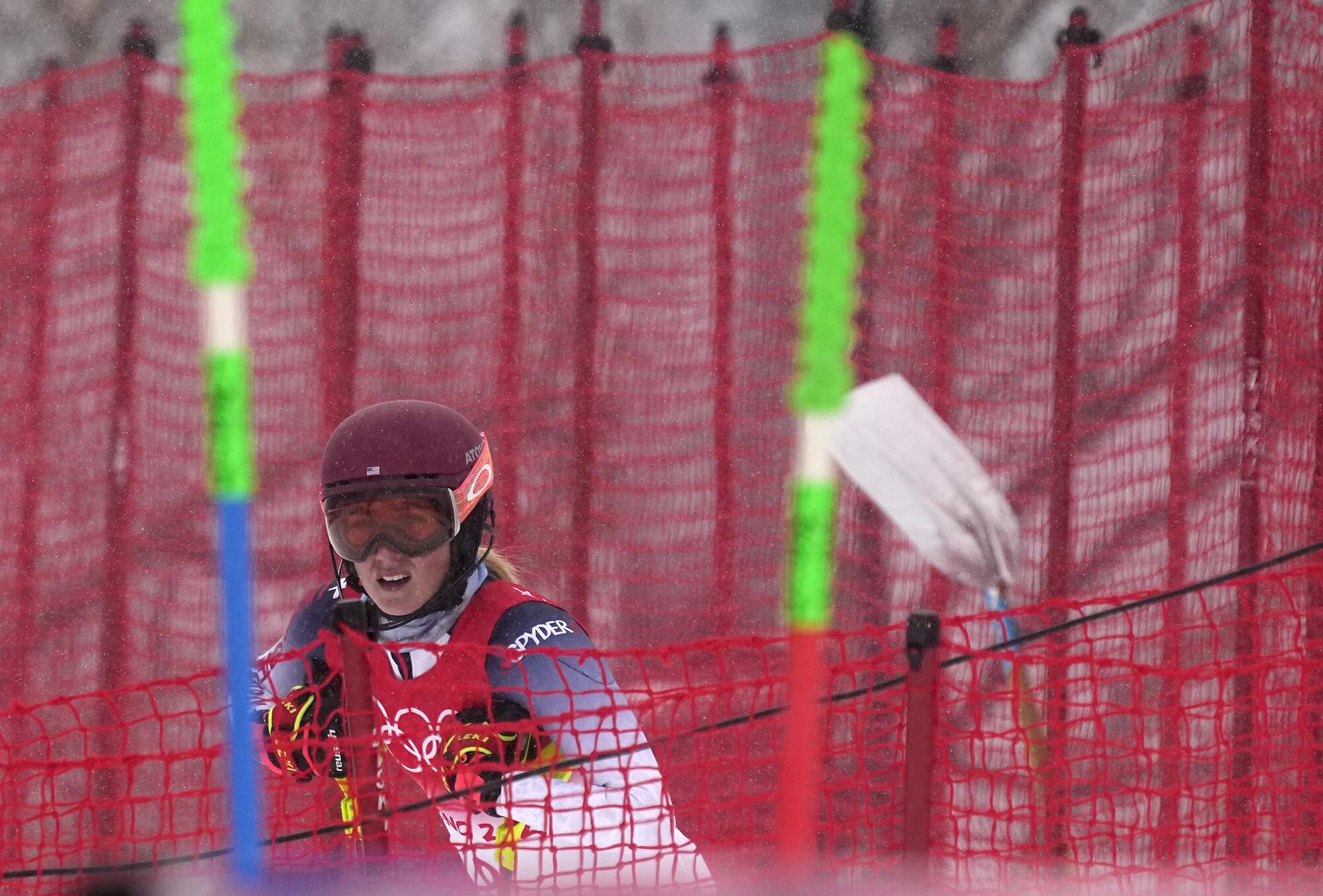
Shiffrin will compete in the mixed team parallel event Friday in the final Alpine event at the Games. But the sting will not ease anytime soon from the last 10 days when nothing went as expected.
“There’s going to be a whole chaotic mess of crap that people are saying about how I just fantastically failed these last couple of weeks in the moments that actually counted,” she said. “It’s really strange but I’m not even afraid of that right now and maybe it’s because I don’t have any emotional energy to give any more.”
The snow kept falling. The Swiss celebration continued. And Shiffrin wasn’t any closer to an answer.
More to Read
Go beyond the scoreboard
Get the latest on L.A.'s teams in the daily Sports Report newsletter.
You may occasionally receive promotional content from the Los Angeles Times.
